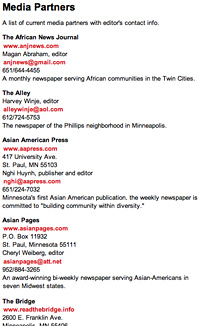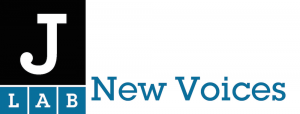In its second year, the Twin Cities Media Alliance and its community journalism initiative, the Twin Cities Daily Planet, grew dramatically. In June 2007 alone the site published 19 original articles by citizen journalists, and over 100 articles from its network of media partners. The number of original news and opinion pieces increased in part because the Daily Planet began paying contributors $30 to $100 per story.
Although traffic on the site has steadily risen, they recently discovered that the statistics they relied from their Web hosting company were inflated. Google Analytics, however, tracked 42,273 unique visitors between June 23 – July 23, 2007, and 81,073 page views.
In the second year, the Daily Planet also built stronger partnerships, expanding its list to 49 community media outlets and a roster of regular bloggers. It struck a deal with community radio station KFAI to post mp3 audio news reports, and partnered with Minnesota Public Radio on a public forum recorded for broadcast titled Iran and America: Context, Connections and Conflict.
 The Daily Planet also worked to build a sense of community and mutuality among its participating publications. Editor Mary Turck sends out a “Daily Planet Shares” list of stories that appeared originally in the Daily Planet, available for publication by all media partners, free of charge.
The Daily Planet also worked to build a sense of community and mutuality among its participating publications. Editor Mary Turck sends out a “Daily Planet Shares” list of stories that appeared originally in the Daily Planet, available for publication by all media partners, free of charge.
On the technology front, the site recently upgraded its content management system from Drupal 4.6 to Drupal 5.1. And, the site has begun using more multimedia content, including slide shows and video news reports (via YouTube).
To invite more user-generated content, Twin Cities Media Alliance has offered how-to classes through Minneapolis Public Library and Minneapolis Community Education on citizen journalism, photojournalism, neighborhood blogging, and video news reporting with amateur equipment and software.
Cultural diversity and understanding are top priority for the Daily Planet. The site regularly brings stories from Hmong Today, La Prensa de Minnesota, the African American community paper Minnesota Spokesman Recorder, Asian Pages and other minority media to readers who otherwise would not be exposed to these perspectives.
Project Founder Jeremy Iggers says, “We have started discussions with the director of a Saint Paul ESL program about how to incorporate writing assignments for the Daily Planet into her teaching curriculum. We hope that one outcome will be an increase in the number of immigrant voices.”
Iggers is proud of the synergy his project has helped create. For example, Abdirahman Aynte, editor of the Somali community paper Hiiraan Online, gained national media attention and a Minnesota Monitor blogging fellowship that enabled him to devote himself full-time to journalism. Aynte is now the elected board chair of the Twin Cities Media Alliance. His reporting has been published in La Prensa de Minnesota, Mshale (African immigrant publication) and the Daily Planet, while Hiiraan Online has reprinted articles from the Daily Planet and the African News Journal. This is a model for networked journalism.
According to Iggers, the mainstream media in town have taken notice.
“We have been told that The Daily Planet was a significant factor in the Star Tribune’s decision to launch its own alternative local news Web site, buzz.mn, and stories from The Daily Planet are now regularly featured as links on buzz.mn. We are also told that reporters at the Pioneer Press often check the Daily Planet for story tips.”
The financial picture at The Daily Planet looks promising. In its second year of operation, The Twin Cities Media Alliance received a $35,000 grant each from the McKnight Foundation and the St. Paul Foundation, $40,000 from the McCormick Tribune Foundation, $50,000 from the Minneapolis Foundation, and $10,000 from the Headwaters Foundation. Other grant requests are pending.
The site now has a part-time advertising sales representative and hopes a demographic survey to find out more about its readers will help boost ad sales.
Classes are another source of income. Although most are offered at cost with low registration fees, Twin Cities Media Alliance did charge $100 for a full-day media strategies for nonprofits workshop which drew 55 participants, netting $3,500.
The Daily Planet has much to be proud about. They have won a Knight-Batten Award for Innovations in Journalism, and a dot.org award from the Minnesota Council of Non-Profits. They have also increased the diversity of their board, media partners and contributing journalists.
But some concerns remain: Will they be able to attract enough ad revenue to realize their vision? What role will the Twin Cities Media Alliance play in the Minneapolis wireless network currently under construction? (They hope to win contracts to provide training and content for neighborhood wireless portals.) And, finally, will a new online news operation, organized by former Star Tribune publisher Joel Kramer lead to a content-sharing agreement, or will the Daily Planet “be overshadowed by a new, better-funded and more professional operation?” ponders Iggers.



